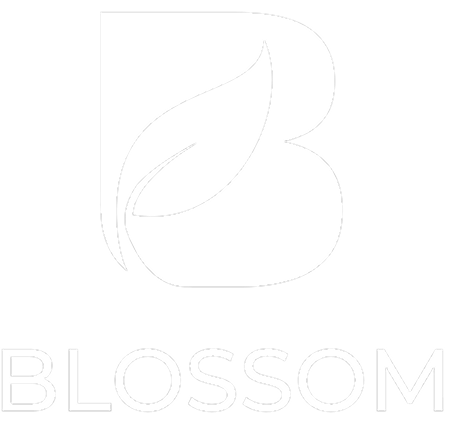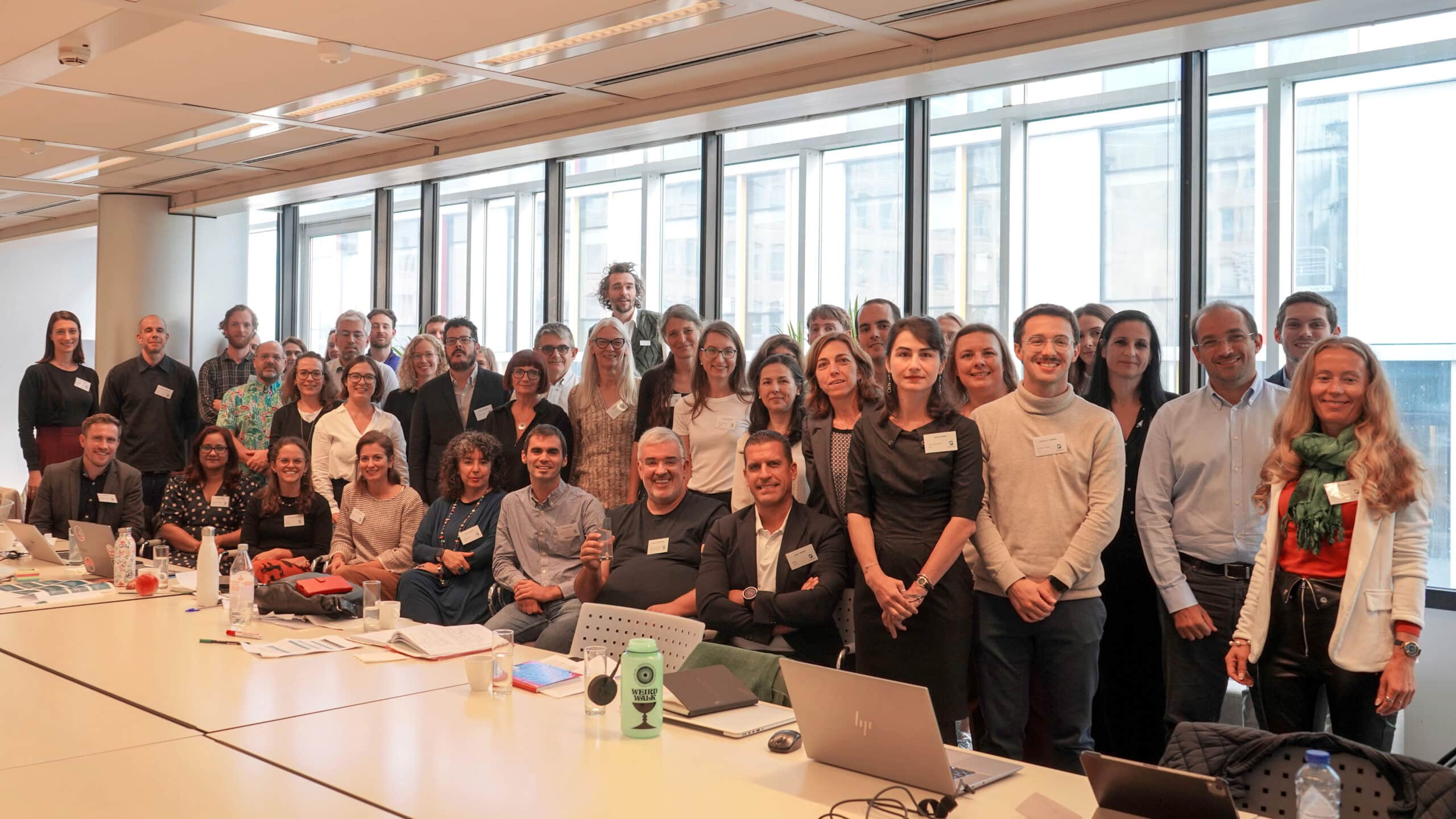Date: 29–30 September 2025
Location: Skyline Venue, Rue des Tréves 74, Brussels – Europa Room
The BLOSSOM project launched its journey with a two-day kick-off meeting in Brussels, hosted at the Skyline venue in the heart of the EU Quarter. The event brought together 29 consortium partners from across Europe to align on the project’s vision, work plan, and collaborative structure for delivering bankable, sustainable, and inclusive financial solutions across Europe.
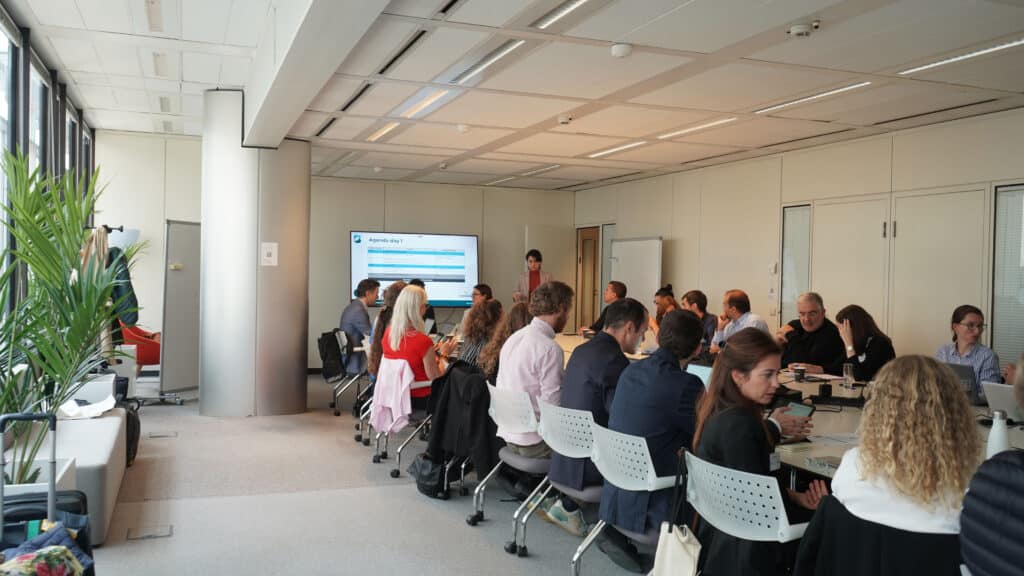
🔹 Day 1 – Setting the stage for collaboration
The first day began with registration and networking over coffee, setting a relaxed yet purposeful tone for the afternoon.
The welcome address was delivered by Dimitrios Sofianopoulos, Project Officer at the European Commission, who emphasized the importance of BLOSSOM’s mission in addressing financial, legal, and social barriers to inclusive economic participation.
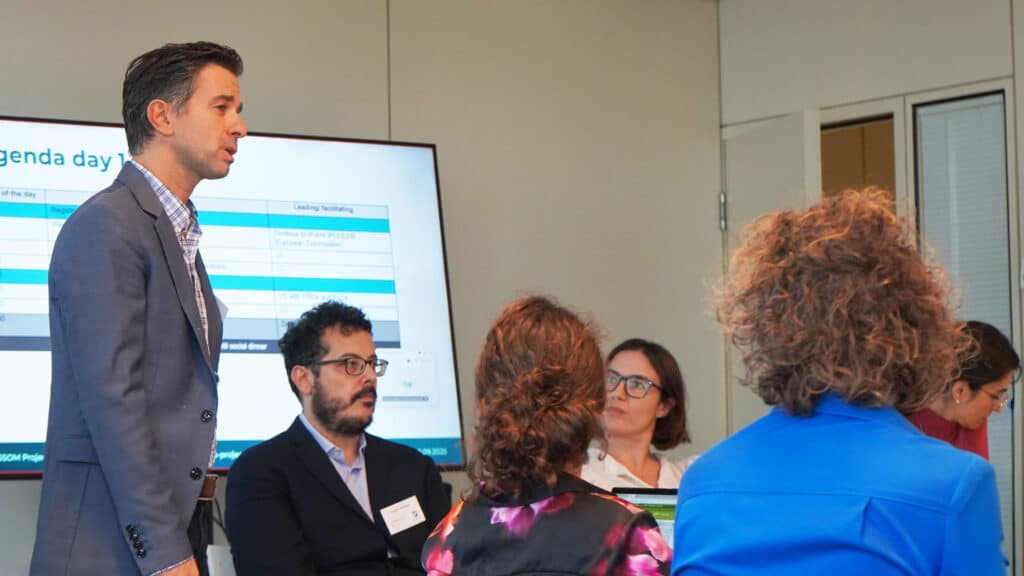
Following this, the coordination team (Lisbon Council) provided an overview of the project management structure and initial priorities, underlining the need for cross-sectoral collaboration and early alignment among the work packages.
WP1 presented its foundational role in ensuring smooth management and coordination of the BLOSSOM project. It focuses on promoting a shared understanding of the project goals, fostering collaboration among partners, and establishing effective ways of working together. Emphasizing that while there are eight distinct work packages, they all contribute to one unified project, WP1 ensures alignment, communication, and cohesion across all tasks and teams.
A key working session focused on brainstorming models for bankable solutions, encouraging partners to reflect on practical, scalable financial mechanisms that meet the needs of diverse communities and stakeholders.
Later, a targeted session zoomed in on the front runner cities and the follower cities. The bankable solutions defined in BLOSSOM will be demonstrated in our front runner Cities (Birmingham, Lisbon, and Kielce), which will test the methodology and make it available for replication up to the planning stage in the replicating case studies (Region of Alentejo, Parma, Aarhus, and Newham).
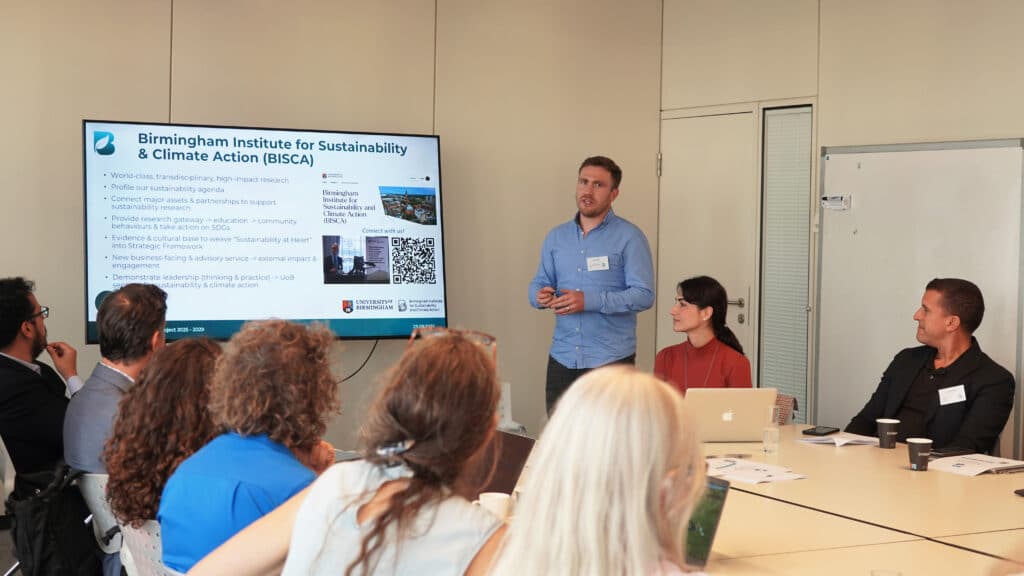
Day 1 concluded with the first round of interviews with work package (WP) leaders to capture their initial perspectives and strategic priorities. In the evening, participants gathered at Chez Firas, a Syrian restaurant offering an informal setting that fostered bonding and cultural exchange.
🔹 Day 2 – Deep dive into work plans and co-creation
The second day started with a welcome coffee and an interactive networking exercise, preparing participants for a full day of planning and knowledge-sharing.
Each technical work package presented its updated plans for the next few months and beyond:
-
- WP4 (CENTRO DE ESTUDIOS DE MATERIALES Y CONTROL DE OBRA SA): presented its approach to delivering the BLOSSOM technical solution, aimed at enabling end-users to co-design and co-create implementations. The team outlined plans for developing data management and sharing mechanisms, a Digital Twin (DT) tool for model visualization and simulation, and a community participation platform to foster collaboration. They also introduced a KPI definition tool to monitor and evaluate solutions. The work will culminate in a replicable pathway for deploying BLOSSOM technical solutions in various contexts.
-
- WP5 (University of Economics in Katowice): presented its role as the key implementation pillar of BLOSSOM, focusing on integrating technical, social, and financial dimensions within Living Labs. Building on the Co-designed Investing Models Framework (IMF) from WP2 and the Evaluation Modelling Toolkit (EMT) from WP3, WP5 aims to operationalize climate-resilient, bankable solutions in real-world settings. The outcomes of WP5 will feed directly into WP6, which handles implementation and validation across case studies, and WP7, which focuses on scaling, knowledge transfer, and ensuring long-term financial sustainability.
-
- WP3 (RESILIENCE GUARD GMBH): presented its plans for advancing the Evaluation Modelling Toolkit (EMT), detailing a comprehensive approach to climate risk assessment. Key steps include developing a high-resolution exposure database using AI tools, modeling and downscaling climate hazards, and conducting asset-level vulnerability and risk assessments. The work also involves simulating socioeconomic and community well-being impacts, designing tailored insurance products based on climate risk, and creating innovative financial tools alongside a climate investment plan.
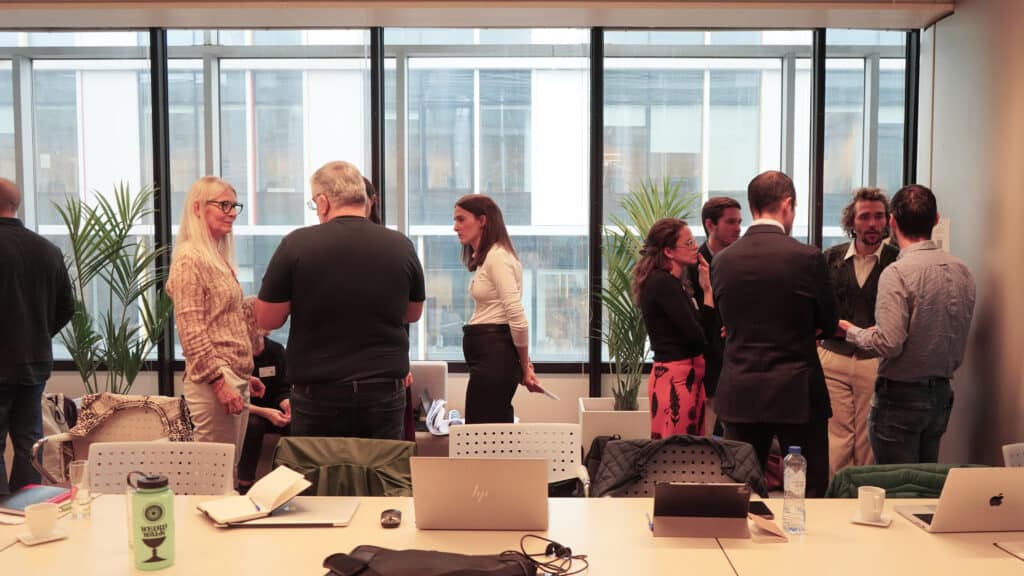
The mid-morning session shifted to WP8, who presented its plan to maximise the project’s impact through targeted communication, dissemination, and stakeholder engagement strategies. The work package is designed to raise awareness of BLOSSOM’s results among scientific, industrial, and general public communities, while actively engaging end-users and key influencers within the BLOSSOM ecosystem. A central element of WP8 is the creation of Communities of Practice (CoPs), which will collaborate to implement selected transformative solutions. WP8 will also ensure that project outcomes are effectively shared with relevant audiences through appropriate channels and will define sustainability models for both commercial and non-commercial outputs.
During the meeting, it was organized a workshop on the development of an elevator pitch for the project, with Lisbon Council (LC) and Digital for Planet (D4P) facilitating participants identify the core value and impact of BLOSSOM into short, accessible messages, an essential step for future outreach and stakeholder engagement.
This led into a collaborative session on stakeholder and events mapping, jointly led by D4P and Climate-kic (CKIC). The session aimed to ensure that all partners are aligned on engagement strategies and upcoming opportunities for dissemination and co-creation.
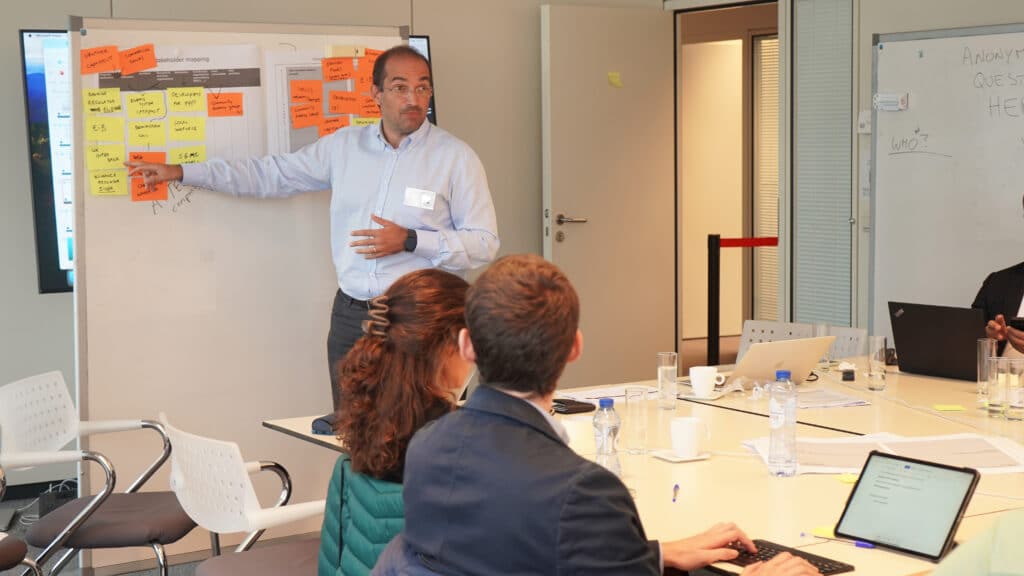
The final technical sessions focused on what needs to be delivered by month 18 (M18):
-
- WP6 (The Institute of communication and computer systems): WP6 presented its plan to design, implement, and operate three pilot projects, serving as a key phase for putting co-created solutions from WP5 into practice. The pilots will integrate real-life data with Digital Twin (DT) simulations to test and monitor the effectiveness of selected interventions. WP6 will build on inputs from WP3, WP4, and WP5, and employ tools from WP3 for performance evaluation. Spanning from month 18 to 45, the work package includes tasks such as implementation planning, customization of institutional and technical frameworks, city readiness and procurement, deployment of interventions, and thorough impact assessment. Results from WP6 will directly feed into WP7 to support scaling and long-term sustainability.
-
- WP7 (CKIC): presented its plan to establish evaluation frameworks and align policy pathways that support the scaling and long-term sustainability of climate resilience solutions. This work package plays a pivotal role in equipping project partners with practical tools for planning and financing, while ensuring knowledge is effectively shared and transferred across Front Runner and Follower Cities. Building on outputs from WP6 and earlier phases, WP7 focuses on capacity-building through a structured Training Mission, development of tailored project plans for Follower Cities, and exploration of collaborative procurement models and innovative financing mechanisms. Additional tasks include the creation of Investment Plans for Front Runner Cities and strategic roadmapping to promote bankable, transformative solutions. Spanning from month 18 to 48, WP7 is central to ensuring that tested interventions evolve into scalable, financially sustainable models ready for broader deployment across cities and regions.
Before wrapping up, partners participated in a final brainstorming session to address any unclear concepts, emerging needs, or constraints, creating space for open reflection and ideation.
The day closed with a recap of both days, and a discussion of next steps, including timelines, responsibilities, and follow-up actions. A second round of interviews with WP leads was held by D4P to document insights for future communication activities.
🛠️ Next steps
The kick-off meeting marked a crucial first milestone for BLOSSOM, laying the foundation for a shared vision and an actionable roadmap. Over the coming months, work will intensify across technical, regulatory, and engagement strands, with a continued focus on:
-
- Co-creation with stakeholders
-
- Sustainable, scalable financial solutions
-
- Real-world experimentation through Living Labs
-
- Policy alignment and regulatory innovation
The energy and collaboration displayed in Brussels set the tone for what promises to be an ambitious and impactful journey.
Stay tuned to the BLOSSOM website and LinkedIn page for more updates, resources, and upcoming events.
